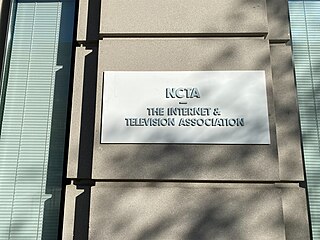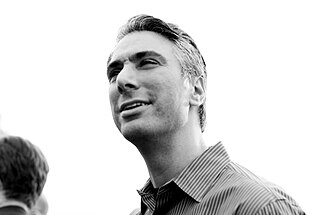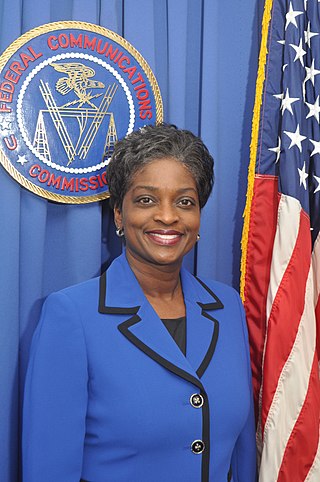
The Federal Communications Commission (FCC) is an independent agency of the United States government that regulates communications by radio, television, wire, satellite, and cable across the United States. The FCC maintains jurisdiction over the areas of broadband access, fair competition, radio frequency use, media responsibility, public safety, and homeland security.

An Internet service provider (ISP) is an organization that provides myriad services related to accessing, using, managing, or participating in the Internet. ISPs can be organized in various forms, such as commercial, community-owned, non-profit, or otherwise privately owned.

Network neutrality, often referred to as net neutrality, is the principle that Internet service providers (ISPs) must treat all Internet communications equally, offering users and online content providers consistent transfer rates regardless of content, website, platform, application, type of equipment, source address, destination address, or method of communication. Net neutrality was advocated for in the 1990s by the presidential administration of Bill Clinton in the United States. Clinton's signing of the Telecommunications Act of 1996, an amendment to the Communications Act of 1934. In 2025, an American court ruled that internet companies should not be regulated like utilities, which weakened net neutrality regulation.

NCTA, formerly known as the National Cable & Telecommunications Association (NCTA), is a trade association representing the broadband and cable television industries in the United States. As of 2011, NCTA represented more than 90% of the U.S. cable market, over 200 cable networks, and various equipment suppliers and service providers to the cable industry.

CTIA is a trade association representing the wireless communications industry in the United States. The association was established in 1984 and is headquartered in Washington, D.C. It is a 501(c)(6) nonprofit membership organization, and represents wireless carriers and suppliers, and manufacturers and providers of wireless products and services.
In the United States, net neutrality—the principle that Internet service providers (ISPs) should make no distinctions between different kinds of content on the Internet, and to not discriminate based on such distinctions—has been an issue of contention between end-users and ISPs since the 1990s. With net neutrality, ISPs may not intentionally block, slow down, or charge different rates for specific online content. Without net neutrality, ISPs may prioritize certain types of traffic, meter others, or potentially block specific types of content, while charging consumers different rates for that content.

Free Press is a United States advocacy group that is part of the media reform or media democracy movement. Their mission includes, "saving Net Neutrality, achieving affordable internet access for all, uplifting the voices of people of color in the media, challenging old and new media gatekeepers to serve the public interest, ending unwarranted surveillance, defending press freedom and reimagining local journalism." The group is a major supporter of net neutrality.

The Internet in the United States grew out of the ARPANET, a network sponsored by the Advanced Research Projects Agency of the U.S. Department of Defense during the 1960s. The Internet in the United States of America in turn provided the foundation for the worldwide Internet of today.

Julius Genachowski is an American lawyer and businessman. He became the Federal Communications Commission Chairman on June 29, 2009. On March 22, 2013, he announced he would be leaving the FCC in the coming weeks. On January 6, 2014, it was announced that Genachowski had joined The Carlyle Group. He transitioned from Partner and Managing Director to Senior Advisor in early 2024.

Kevin Werbach is an American academic, businessman and author. In 2002, he founded the Supernova Group, a technology analysis and consulting firm. Since 2004, Werbach is an Associate Professor of Legal Studies and Business Ethics at The Wharton School, University of Pennsylvania. He writes about business, policy, and social implications of emerging Internet and communications technologies.

Mignon Letitia Clyburn is an American former government official who served as a member of the Federal Communications Commission (FCC) from 2009 to 2018.

Meredith Attwell Baker is the president and chief executive officer of CTIA, an industry trade group that represents the international wireless telecommunications industry. From 2009 to 2011, Baker was a member of the United States Federal Communications Commission, nominated by U.S. President Barack H. Obama. She also served in the National Telecommunications and Information Administration as a political appointee, and was subsequently named a deputy assistant secretary of the Commerce Department by President George W. Bush in February 2007.
The Federal Communications Commission Open Internet Order of 2010 is a set of regulations that move towards the establishment of the internet neutrality concept. Some opponents of net neutrality believe such internet regulation would inhibit innovation by preventing providers from capitalizing on their broadband investments and reinvesting that money into higher quality services for consumers. Supporters of net neutrality argue that the presence of content restrictions by network providers represents a threat to individual expression and the rights of the First Amendment. Open Internet strikes a balance between these two camps by creating a compromised set of regulations that treats all internet traffic in "roughly the same way". In Verizon v. FCC, the Court of Appeals for the D.C. Circuit vacated portions of the order that the court determined could only be applied to common carriers.

Ajit Varadaraj Pai is an American lawyer who served as chairman of the Federal Communications Commission (FCC) from 2017 to 2021. He has been a partner at the private-equity firm Searchlight Capital since April 2021.

Jessica Rosenworcel is an American attorney serving as a member and chairwoman of the Federal Communications Commission (FCC). She originally served on the FCC from May 11, 2012, to January 3, 2017, and was confirmed by the Senate for an additional term on August 3, 2017. She was named to serve as acting chairwoman in January 2021 and designated permanent chairwoman in October 2021. She was confirmed for another term by the Senate in December 2021. Rosenworcel's current term runs for five years beginning July 1, 2020.

Verizon Communications Inc. v. Federal Communications Commission, 740 F.3d 623, was a case at the U.S. Court of Appeals for the D.C. Circuit vacating portions of the FCC Open Internet Order of 2010, which the court determined could only be applied to common carriers and not to Internet service providers. The case was initiated by Verizon, which would have been subjected to the proposed FCC rules, though they had not yet gone into effect. The case has been regarded as an important precedent on whether the FCC can regulate network neutrality.
Net neutrality law refers to laws and regulations which enforce the principle of net neutrality.

United States Telecom Association v. FCC, 825 F. 3d 674, was a case at the U.S. Court of Appeals for the D.C. Circuit upholding an action by the Federal Communications Commission (FCC) the previous year in which broadband Internet was reclassified as a "telecommunications service" under the Communications Act of 1934, after which Internet service providers (ISPs) were required to follow common carrier regulations.
"Net Neutrality" is the first segment devoted to net neutrality in the United States of the HBO news satire television series Last Week Tonight with John Oliver. It aired for 13 minutes on June 1, 2014, as part of the fifth episode of Last Week Tonight's first season.

Mozilla Corp. v. FCC, 940 F. 3d 1 was a ruling the United States Court of Appeals for the District of Columbia Circuit in 2019 related to net neutrality in the United States. The case centered on the Federal Communications Commission (FCC)'s decision in 2017 to rollback its prior 2015 Open Internet Order, reclassifying Internet services as an information service rather than as a common carrier, deregulating principles of net neutrality that had been put in place with the 2015 order. The proposed rollback had been publicly criticized during the open period of discussion, and following the FCC's issuing of the rollback, several states and Internet companies sued the FCC. These cases were consolidated into the one led by the Mozilla Corporation.















